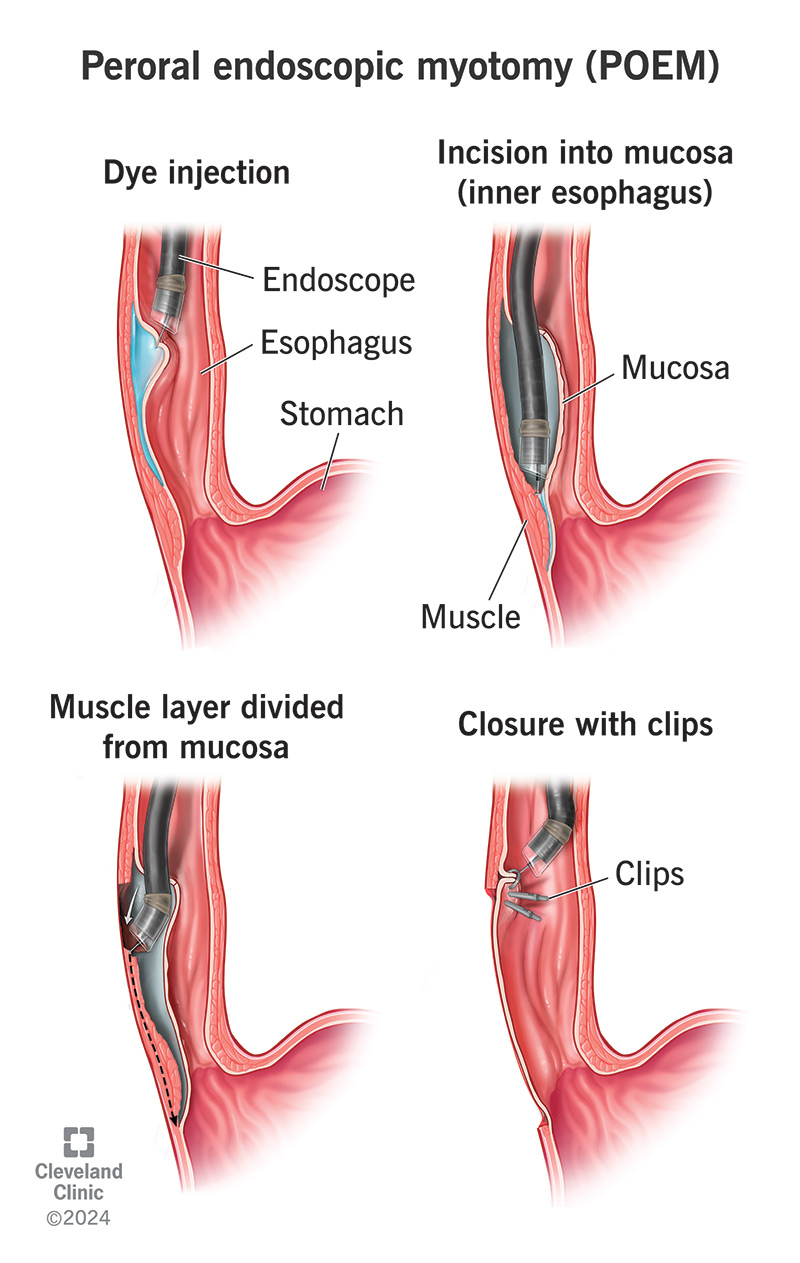Peroral endoscopic myotomy (POEM) is a minimally invasive treatment for achalasia and other conditions that make it hard for you to swallow food. The procedure loosens muscles in your esophagus so food can move to your stomach. It takes about 10 days to two weeks to recover from a POEM procedure.
Advertisement
Cleveland Clinic is a non-profit academic medical center. Advertising on our site helps support our mission. We do not endorse non-Cleveland Clinic products or services. Policy

Image content: This image is available to view online.
View image online (https://my.clevelandclinic.org/-/scassets/Images/org/health/articles/peroral-endoscopic-myotomy-poem.jpg)
Peroral endoscopic myotomy (peh-oral-endo-scopic-my-O-toe-me), or POEM, is a common treatment for achalasia and other esophageal motility disorders. These disorders make it hard for you to swallow food.
Advertisement
Cleveland Clinic is a non-profit academic medical center. Advertising on our site helps support our mission. We do not endorse non-Cleveland Clinic products or services. Policy
In a POEM procedure, your healthcare provider uses tiny tools attached to a flexible tube (endoscope) to make small cuts in your esophageal muscles. The cuts loosen the muscles so food can move to your stomach from your esophagus. The procedure isn’t a type of surgery because providers don’t make cuts (incisions) in your skin.
POEM stands for: peroral (doing a procedure through your mouth), endoscopic (meaning it’s done with a flexible tube called an endoscope) and myotomy (the medical term for cutting muscles).
Your healthcare provider will give you detailed information and answer your questions. In general, you’ll:
First, your anesthesiologist gives you general anesthesia, so you’ll sleep during the procedure. You’ll receive anesthesia through an intravenous line (IV). You’ll also receive antibiotics through the IV. During the POEM procedure, your provider will:
Advertisement
The procedure may take one to three hours to complete.
You’ll stay at the hospital overnight so your care team can watch for any complications. The next day, you’ll:
The most significant benefit is that your healthcare provider can treat conditions like achalasia without making large incisions (cuts) in your chest or belly.
A recent study concluded POEM has an 88% clinical success rate. In this case, it means the POEM procedure loosened esophageal muscles. That study also found that 95% percent of people who had the procedure had significantly fewer issues with swallowing food.
POEM complications are rare, but they can occur. Potential complications include:
You’ll be able to go back to work seven days after your procedure. But that recovery time may be different if your job involves moving or lifting anything that weighs more than 10 pounds (4.5 kilograms). In that case, ask your provider when you should be able to return to work.
You’ll start eating soft foods seven days after your procedure. You’ll eat low-fiber food that’s soft in texture for 10 days to two weeks.
You’ll have a follow-up appointment 10 days after your procedure. Three months later, you’ll have an esophagram. Your healthcare provider will do the test to see if your esophagus empties when you swallow.
Contact your surgeon if you have symptoms after your procedure like:
We all get food caught in our throat occasionally. But when that “something’s stuck” feeling gets worse, it may mean there’s an issue with the muscles in your esophagus. If that’s your situation, your healthcare provider may recommend you have a POEM procedure.
POEM stands for peroral endoscopic myotomy. This procedure involves loosening the muscles in your esophagus. Loosening those muscles lets food move through your esophagus to your stomach instead of getting stuck. Research shows POEM procedures are effective treatments for conditions that affect the muscles in your esophagus.
Advertisement

Sign up for our Health Essentials emails for expert guidance on nutrition, fitness, sleep, skin care and more.
Learn more about the Health Library and our editorial process.
Cleveland Clinic’s health articles are based on evidence-backed information and review by medical professionals to ensure accuracy, reliability and up-to-date clinical standards.
Cleveland Clinic’s health articles are based on evidence-backed information and review by medical professionals to ensure accuracy, reliability and up-to-date clinical standards.
Swallowing disorders (dysphagia) can affect how you eat and drink. Cleveland Clinic is here to help you manage your dysphagia and feel better.
